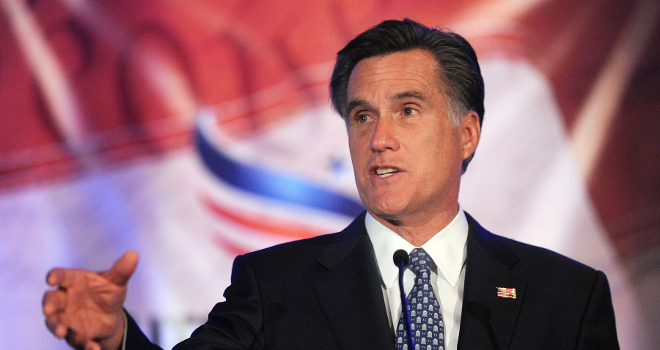Mitt Romney took a pointed dig at Rick Perry in his own home state on Tuesday, alluding to his lack of business experience in an address to the Veterans of Foreign Wars in San Antonio.
“I am a conservative businessman,” Romney told the VFW audience, which Perry had addressed the day before. “I have spent most of my life outside of politics, dealing with real problems in the real economy. Career politicians got us into this mess and they simply don’t know how to get us out.”
Romney has been playing up his private sector experience in the 2012 race, hoping to distinguish himself from fellow governor Perry, and it’s likely the “career politicians” line is going to get a lot of spin before the race is over.
Romney began with a riff on the economy, but the audience was there for a foreign policy speech and that’s what he delivered. Expanding on the themes of his “No Apologies” book, Romney repeatedly painted President Obama as a weak and ineffectual leader who kowtowed to tyrants.
The Obama administration, Romney said, “leaves us with the belief that America should become a lesser power. It flows from the conviction that if we are weak, tyrants will choose to be weak as well; that if we could just talk more, engage more, pass more U.N. resolutions, that peace will bill break out. That may be what they think in that Harvard faculty lounge, but it’s not what they know on the battlefield.”
But Romney crafted his anti-Obama message long before the president initiated a bombing campaign against Libya, which has all but destroyed dictator Moammar Qaddafi’s regime and killed many of his family members. He also crafted it before the President ordered the death of Osama Bin Laden in an operation where he deliberately kept US ally Pakistan in the dark.
The president’s increasingly hawkish resume sits uncomfortably with the “weak” message, but Romney did his best to square the circle. He detached Bin Laden’s death from any White House action by playing up the Navy SEAL mission as a bipartisan affair, telling the crowd that “the final image that Osama bin Laden took with him straight to Hell” was not an elephant or donkey but an American flag. For Romney, it seems, that if on 9/11/01 we were all Americans, then on 5/2/11 we all ordered the Abottabad raid.
On Libya, Romney repeated a familiar GOP line that Obama had failed to explain the mission to the public or define its goals. Speaker Boehner has employed similar rhetoric, which has the benefit of appealing to both pro- and anti-intervention Republicans. Michele Bachmann and Ron Paul firmly opposed the NATO operation, while Romney supported the decision to attack Qaddafi’s forces.
“Today, Qaddafi is on the run and we congratulate the Libyan people and the extraordinary professionalism of our men and women in the armed services,” Romney said. “But when a president sends our men and women into harm’s way, he must first explain their mission, define its success, plan for their victorious exit, provide them with the best weapons and armor in the world, and properly care for them when they come home.” Unmentioned was the fact that so far not a single American soldier has died in the Libya operation.
While Romney pledged to cut waste in defense, he accused Obama of endangering the military by agreeing to “a budget process that could entail cutting defense spending by $850 billion.” The number refers to the debt ceiling agreement between President Obama and House Republicans, which cuts defense spending $350 billion over the next decade but also includes a trigger that will automatically cut an additional $500 billion over the same period if a bipartisan committee can’t agree to savings elsewhere. As Romney noted in the speech, incoming Defense Secretary Leon Panetta has warned the triggered cuts would be severe if enacted.
Perhaps the biggest takeaway from Romney and Perry’s two VFW speeches is that the party does not have a clear post-Bush consensus on foreign policy at the moment beyond unconditional support for Israel and a general suspicion of international institutions. It’s an economy-focused election so this isn’t entirely surprising, but it also speaks to real disagreements within the GOP. Conservative commentators took note that Perry winked at both the more neoconservative and isolationist camps in the GOP in his VFW speech on Monday, condemning “military adventurism” while also calling on Americans to “renew our commitment to taking the fight to the enemy wherever they are before they strike at home.” And that’s nothing compared to some of the lower-tier candidates’ contortions.






